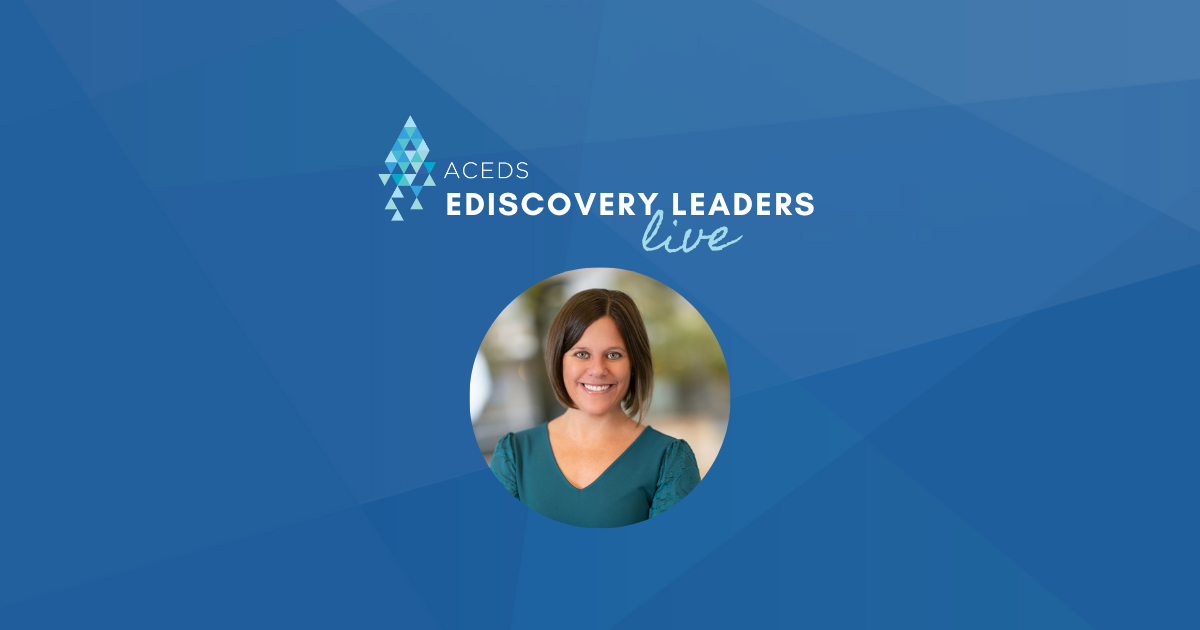eDiscovery Leaders Live: Allison Dunham of Epiq
Allison Dunham, Director, Advanced Technologies, Case Insights at Epiq, joins George Socha, Senior Vice President of Brand Awareness at Reveal, for ACEDS #eDiscoveryLeadersLive.
Allison Dunham is a Director of Advanced Technologies at Epiq and oversees the Case Insights practice. She has significant experience consulting on eDiscovery workflows, as part of Early Case Assessment (ECA), Review Management, and Technology Assisted Review (TAR). Allison is an analytics expert and an ECA thought leader whose proficiencies include the use of analytics and custom techniques that leverage AI to defensibly cull data, as well as innovative solutions to inform legal strategy and reduce litigation spend. Allison holds a BA from Pennsylvania State University and a JD from Michigan State University. She is licensed to practice law in Massachusetts. Allison recently co-authored a chapter in the 2022 edition of eDiscovery for Corporate Counsel, titled “Outsourced Document Review: Data Intelligence, Technologist Lawyers, Advocacy Support.”
After sharing how she got into eDiscovery and her describing her current role at Epiq, Allison dove into analytics. She compared and contrasted using analytics and relying on search terms and encouraged practitioners who are not already doing so to get started with analytics. She discussed the shortcomings of relying exclusively or primarily or search terms, then talked about how analytics can be a better option. Allison described how they make use of analytics, especially advanced analytics, looking at the art of analytics and how analytics can be used to better frame and achieved client goals. She the discussed the differences between analytics in litigation and in investigations, and closed with her vision of the ideal eDiscovery platform.
Key Highlights
- [1:27] Allison’s transition to and path in eDiscovery.
- [2:23] Her current role at Epiq.
- [2:42] What took Allison to TAR.
- [3:27] A secondary focus on TAR, now, with a primary focus on analytics.
- [4:25] Search terms, still the primary tool for many.
- [5:28] How to encourage practitioners to add analytics to the mix.
- [6:04] Where search terms fall short.
- [7:12] The biggest issue with search terms: little to no validation, far less than with analytics.
- [8:08] The place for search terms: after using analytics to identify core content.
- [9:36] Using advanced analytics: find patterns and anomalies and then add layers of analysis.
- [11:16] The art of analytics and how to learn it.
- [12:58] How they support clients.
- [14:10] Understanding client goals and creating plans for how to get there.
- [17:03] When clients insist on focusing on search terms.
- [18:26] Their use of AI models.
- [19:28] The key differences between litigation and investigations when it comes to analytics.
- [20:51] Why the difference in perspectives between litigation and investigations.
- [21:57] Discovery metrics in litigation: tool or weapon?
- [23:21] Process validation.
- [24:50] Some of the most challenging areas they have been tackling.
- [27:17] Tackling short messages.
- [28:18] Her ideal eDiscovery platform.
Key Quotes
- “Almost instantly, [moving to TAR] was a great fit. I know this was something that I could really immerse myself in and really make a difference with not just our reviews but new workflows, innovative workflows, and ultimately saving people time and money.”
- “We are really experts in using the advanced analytics features. Anything that we can grab from the pool of concept searching, using portable models, you name it, we will try that first before we revert to that TAR workflow.”
- “The majority of folks in our industry are not adopting TAR and analytics. And, yes, they rely heavily on using search terms, much to my dismay.”
- “It’s not that I don’t like search terms. I think they do have a time and a place. In my perfect world, it would be later in the discovery process.”
- “TAR is forgiving. If you miss something with analytics, you have a chance; that can come back into your queue. If you miss something with search terms, and that’s left behind and your don’t validate, it’s gone forever. If that was the smoking gun, you’ll never see it.”
- “The science creates the [analytic] tools. But using them and developing a process for them to work together, layering them, is definitely an art.”
- “We have clients that start with a million documents and at 250 thousand they’re not finding anything responsive [using search terms]. They’re a lot more willing to listen and look at your [AI] model than they are in the abstract, without the examples.”
- “I would say on every investigation we do, we set [an AI model] up…. The score from the model, for say an interesting document – interesting, not interesting – is something that we can layer into that analysis on every matter.”
